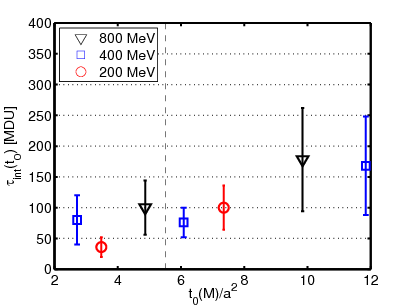| Article | |
| Report number | arXiv:1411.1239 ; WUP-14-14 ; DESY-14-209 ; SFB-CPP-14-86 ; CERN-PH-TH-2014-215 ; WUP 14-14 ; DESY 14-209 ; SFB-CPP-14-86 ; CERN-PH-TH-2014-215 |
| Title | Physical and cut-off effects of heavy sea quarks |
| Author(s) | Knechtli, Francesco (Wuppertal U.) ; Finkenrath, Jacob (Wuppertal U.) ; Leder, Björn (Wuppertal U.) ; Athenodorou, Andreas (Cyprus U.) ; Bruno, Mattia (NIC, Zeuthen ; DESY, Zeuthen) ; Sommer, Rainer (NIC, Zeuthen ; DESY, Zeuthen) ; Marinkovic, Marina (CERN) |
| Publication | SISSA, 2014-11-05 |
| Imprint | 05 Nov 2014 |
| Number of pages | 7 |
| Note | Comments: 7 pages, 6 figures, PoS(LATTICE2014)288 7 pages, 6 figures, PoS(LATTICE2014)288 |
| In: | PoS Lattice2014 (2014) 288 |
| In: | 32nd International Symposium on Lattice Field Theory, Columbia U., New York, NY, USA, 23 - 28 Jun 2014, pp.288 |
| DOI | 10.22323/1.214.0288 |
| Subject category | Particle Physics - Lattice |
| Abstract | We simulate a theory with two dynamical O($a$) improved Wilson quarks whose mass $M$ ranges from a factor eight up to a factor two below the charm quark mass and at three values of the lattice spacing ranging from 0.066 to 0.034 fm. This theory is a prototype to study the decoupling of heavy quarks. We measure the mass and cut-off dependence of ratios of gluonic observables defined from the Wilson flow or the static potential. The size of the 1/$M$ corrections can be determined and disentangled from the lattice artifacts. The difference with the pure gauge theory is at the percent level when two quarks with a mass of the charm quark are present. |
| Copyright/License | publication: © 2014-2025 The Author(s) (License: CC-BY-NC-SA-4.0) preprint: © 2014-2025 CERN (License: CC-BY-3.0) |
Corresponding record in: Inspire
Notice créée le 2014-11-06, modifiée le 2023-03-14


